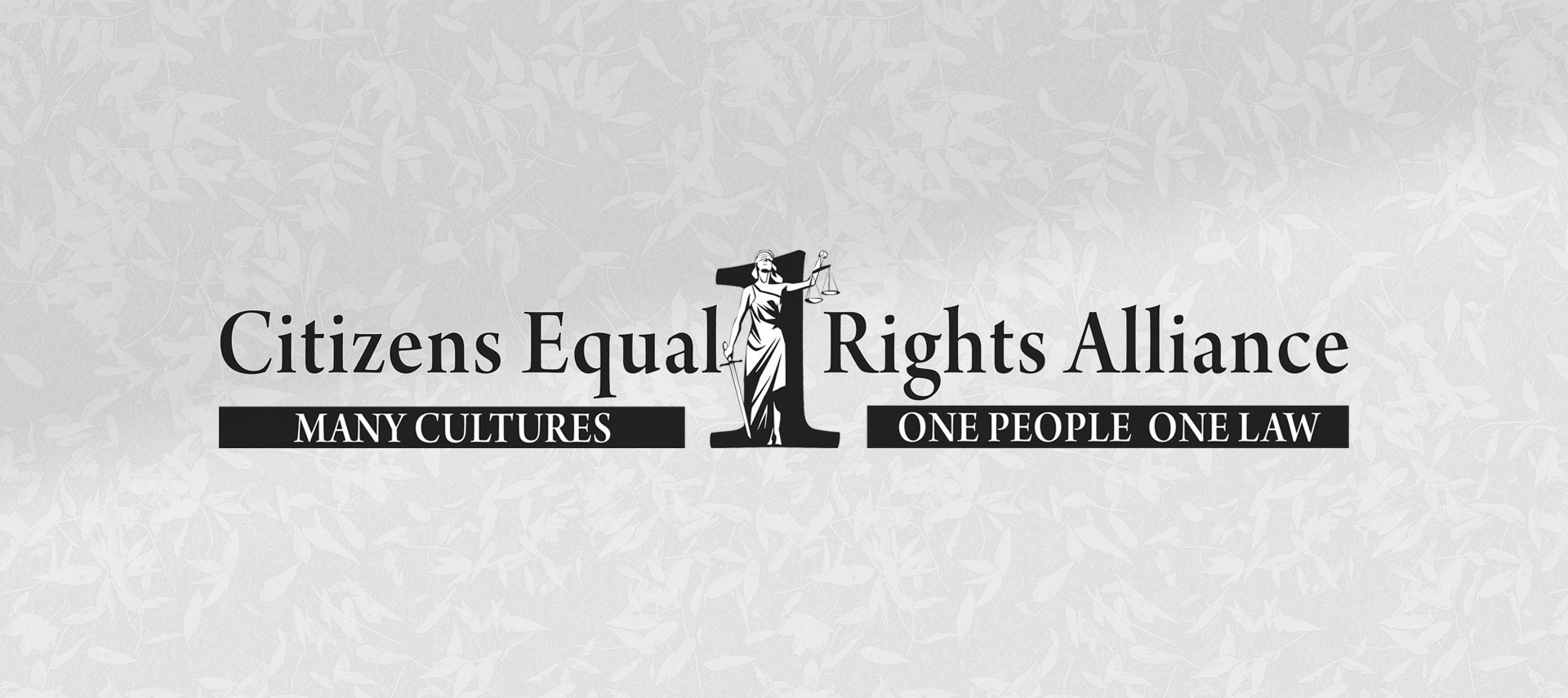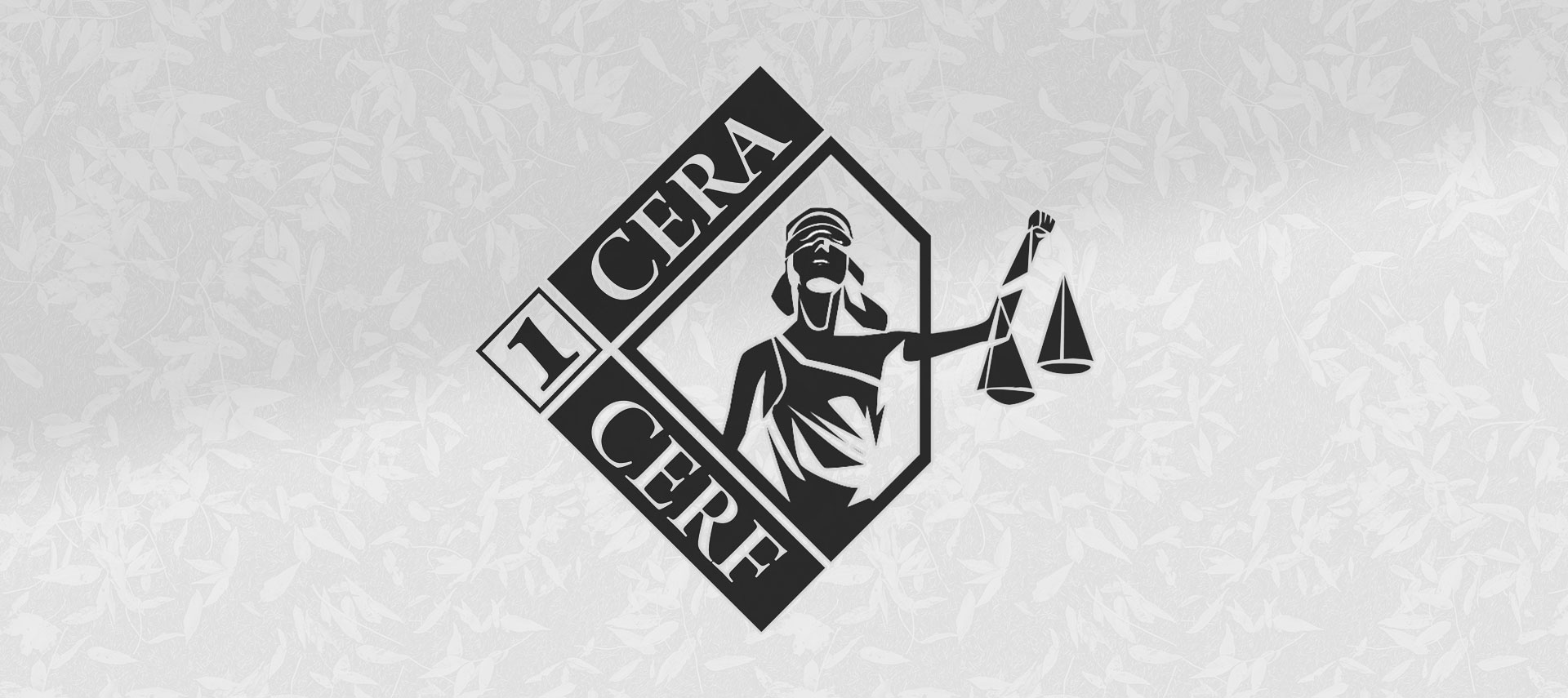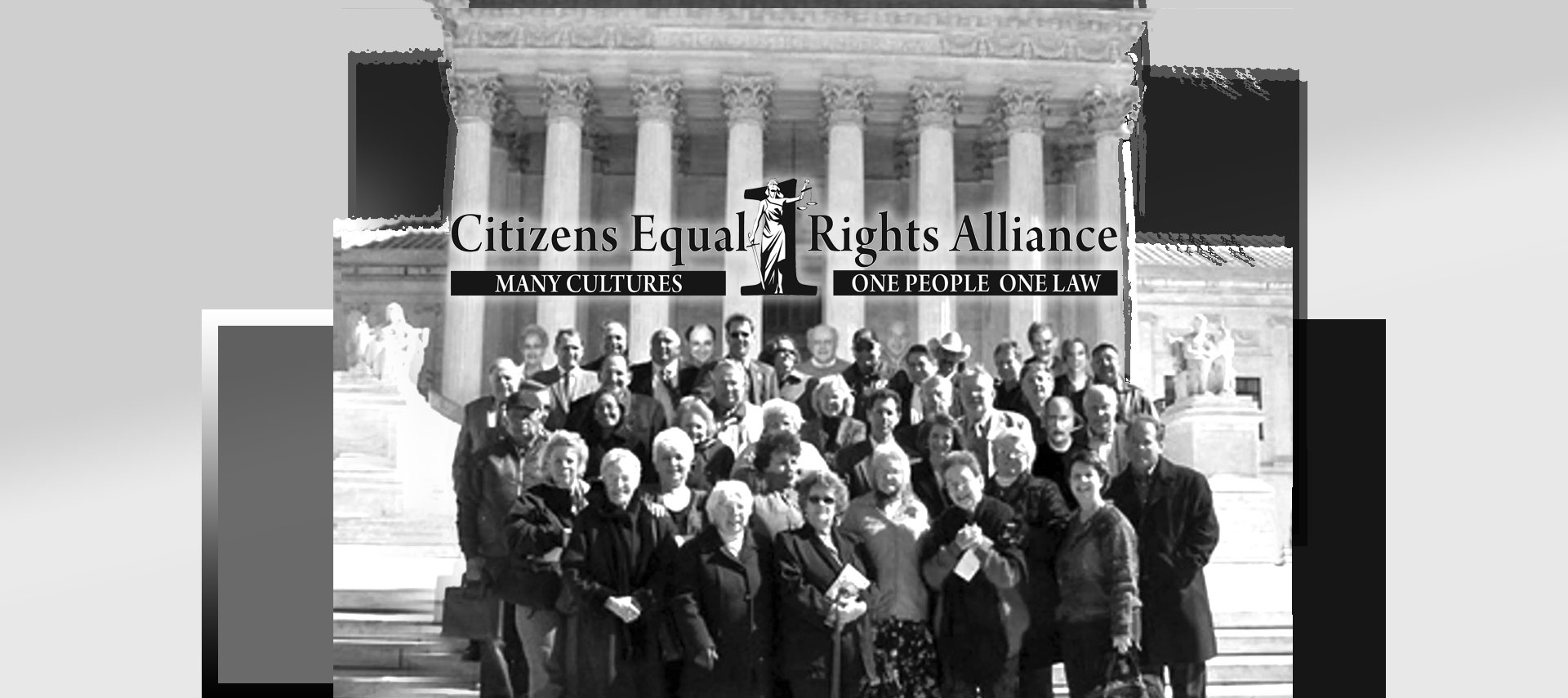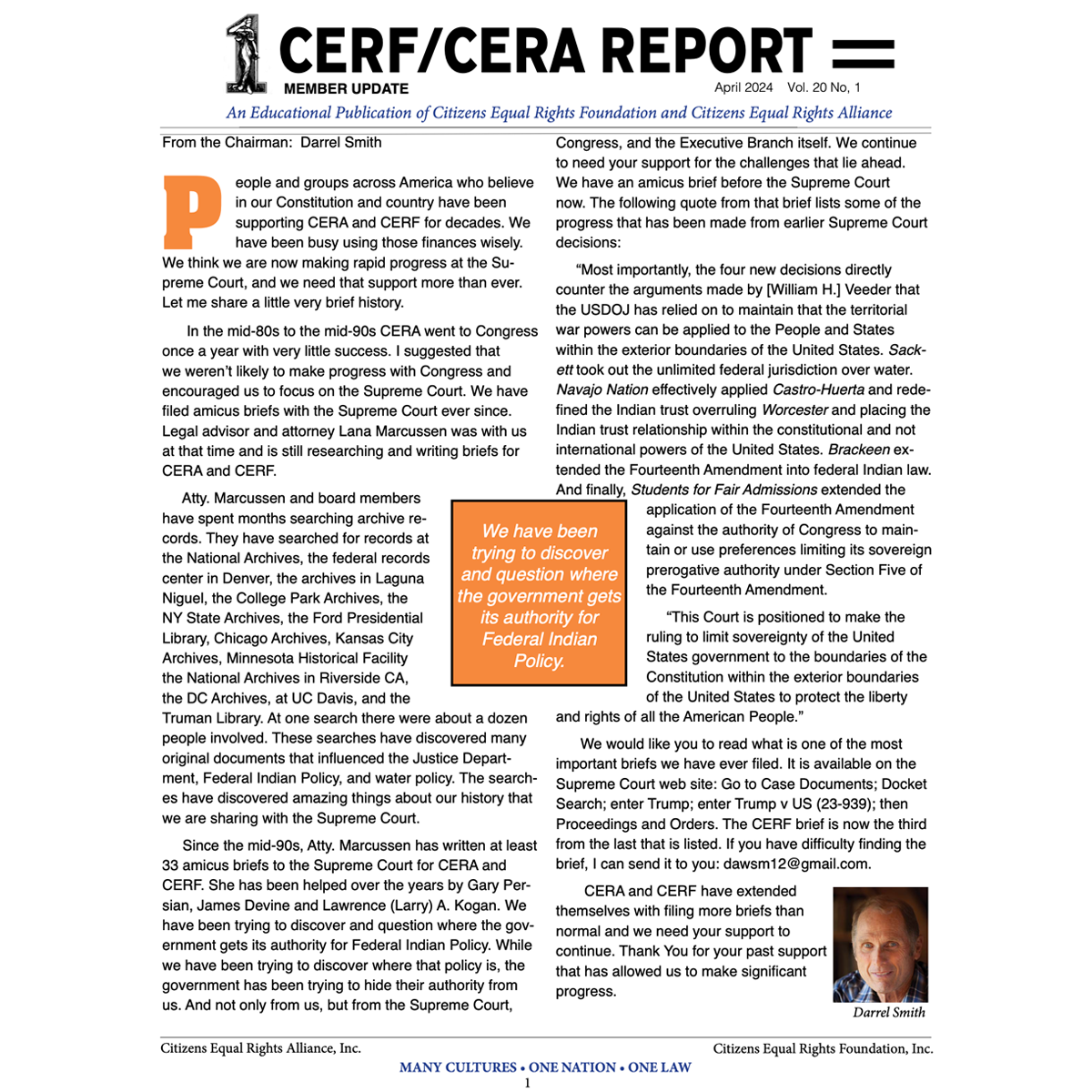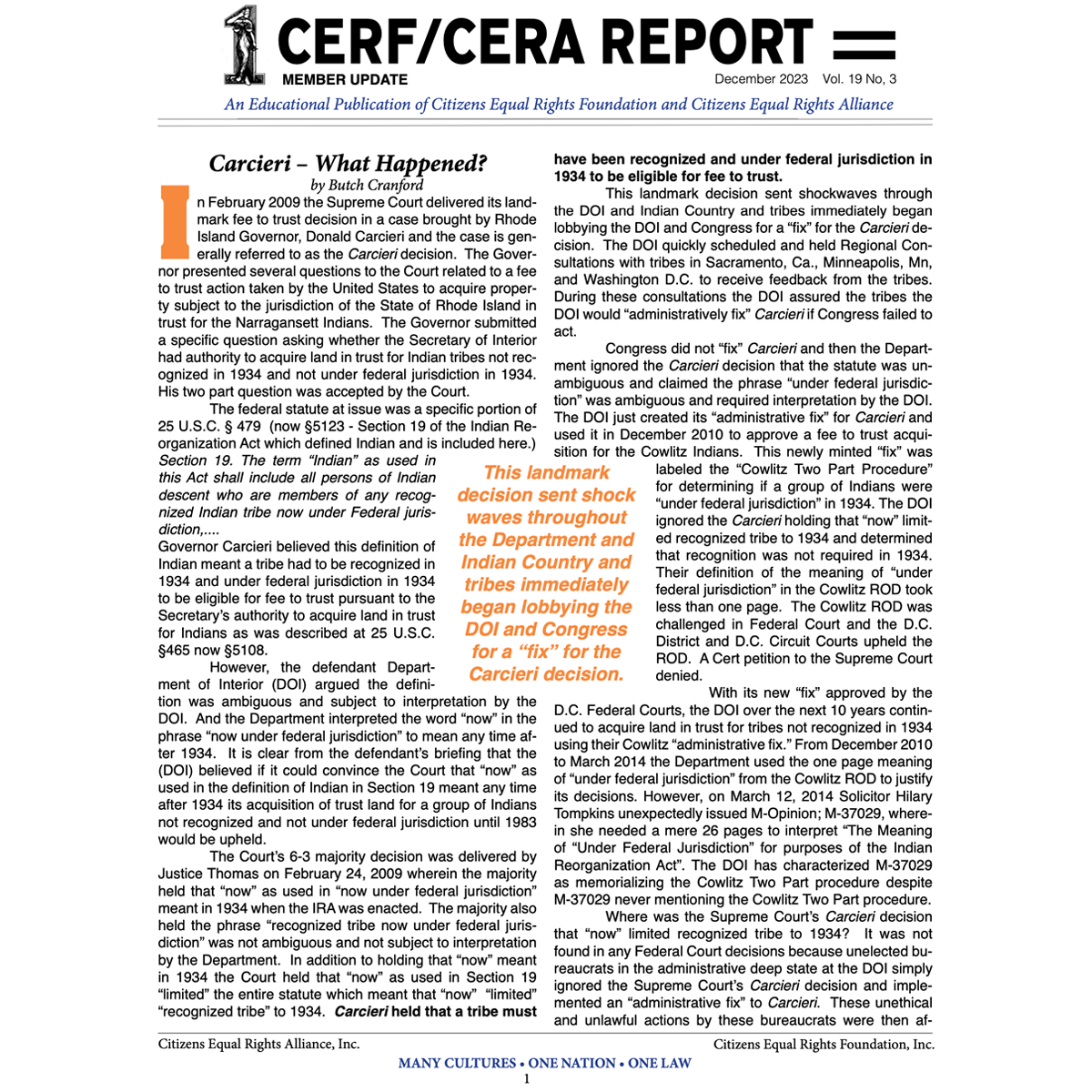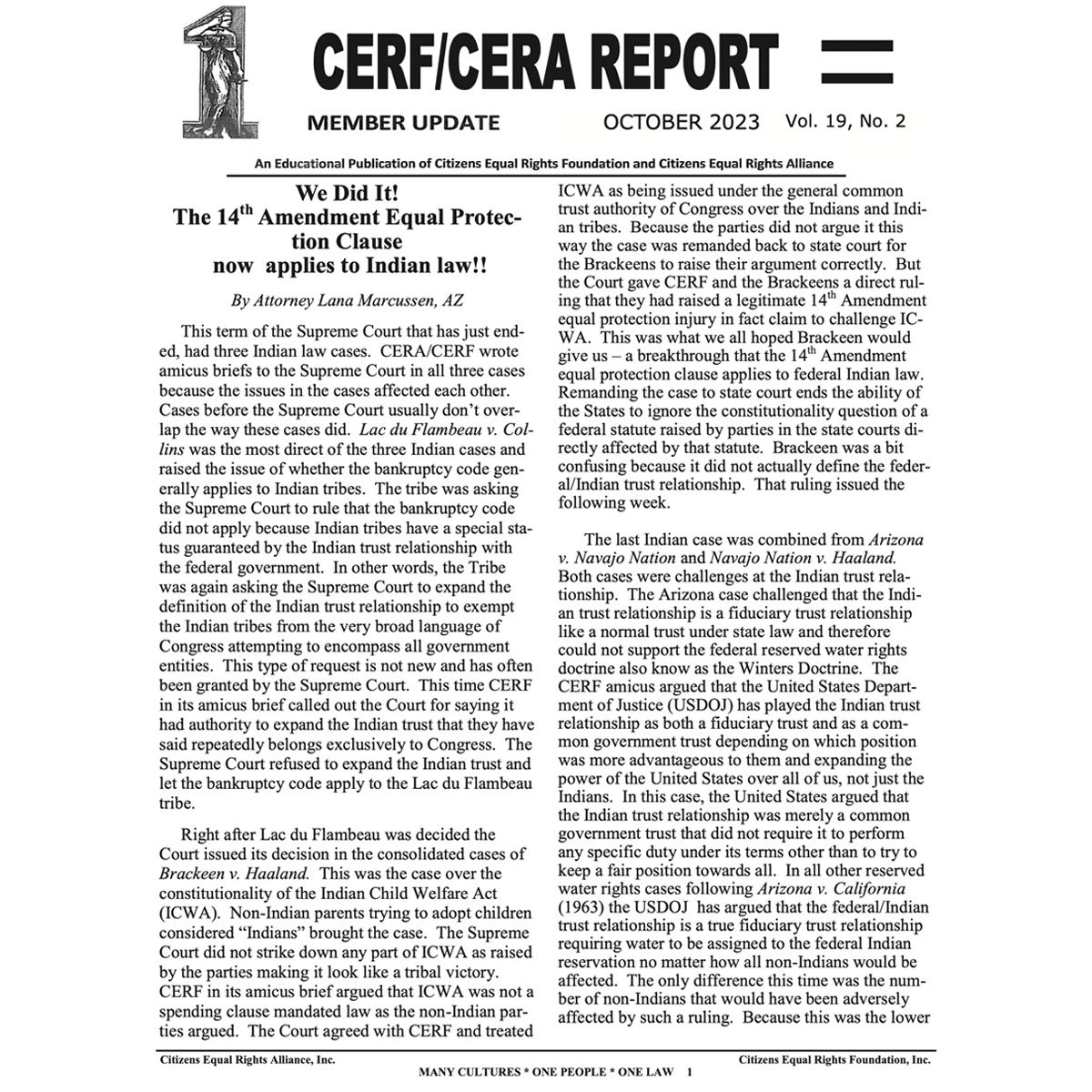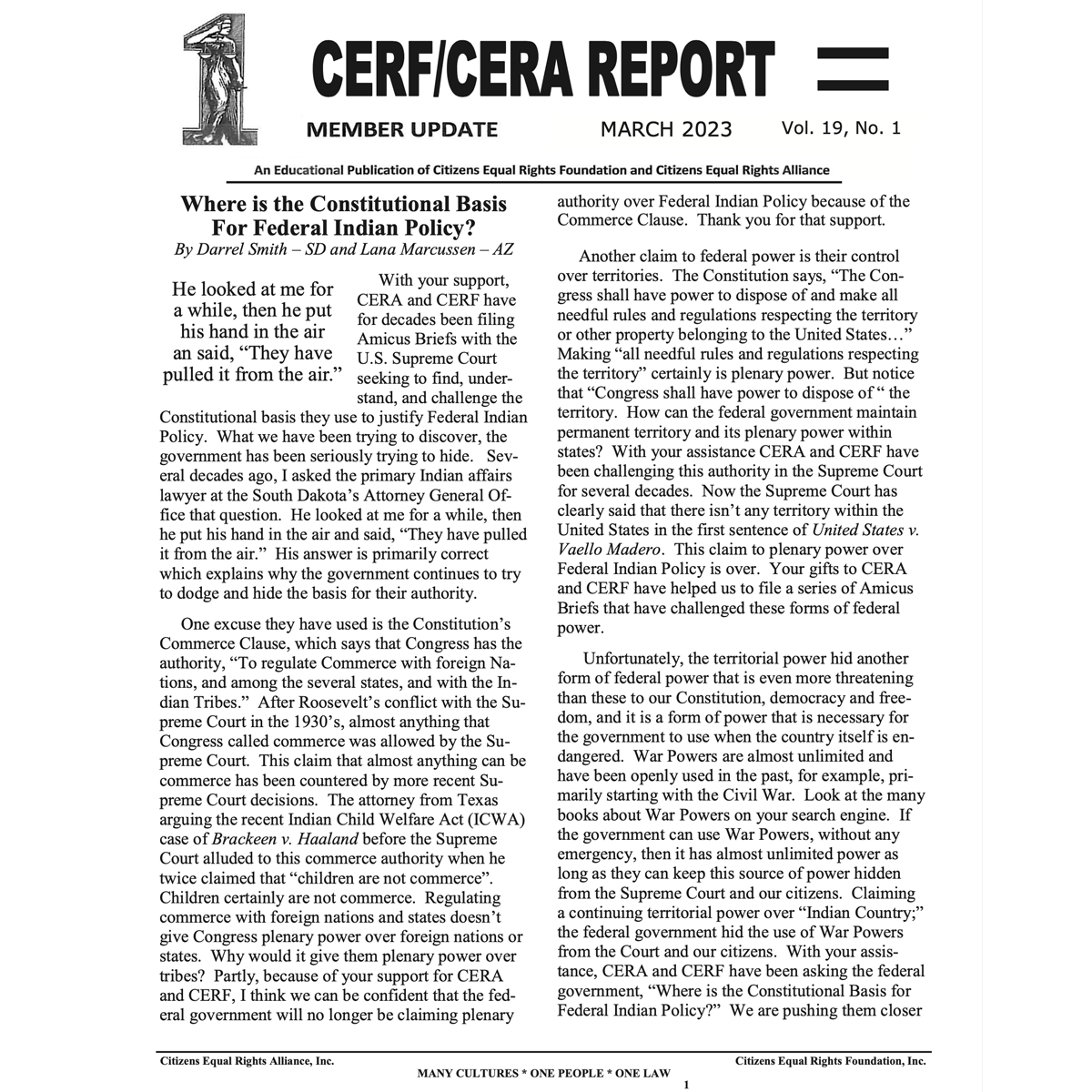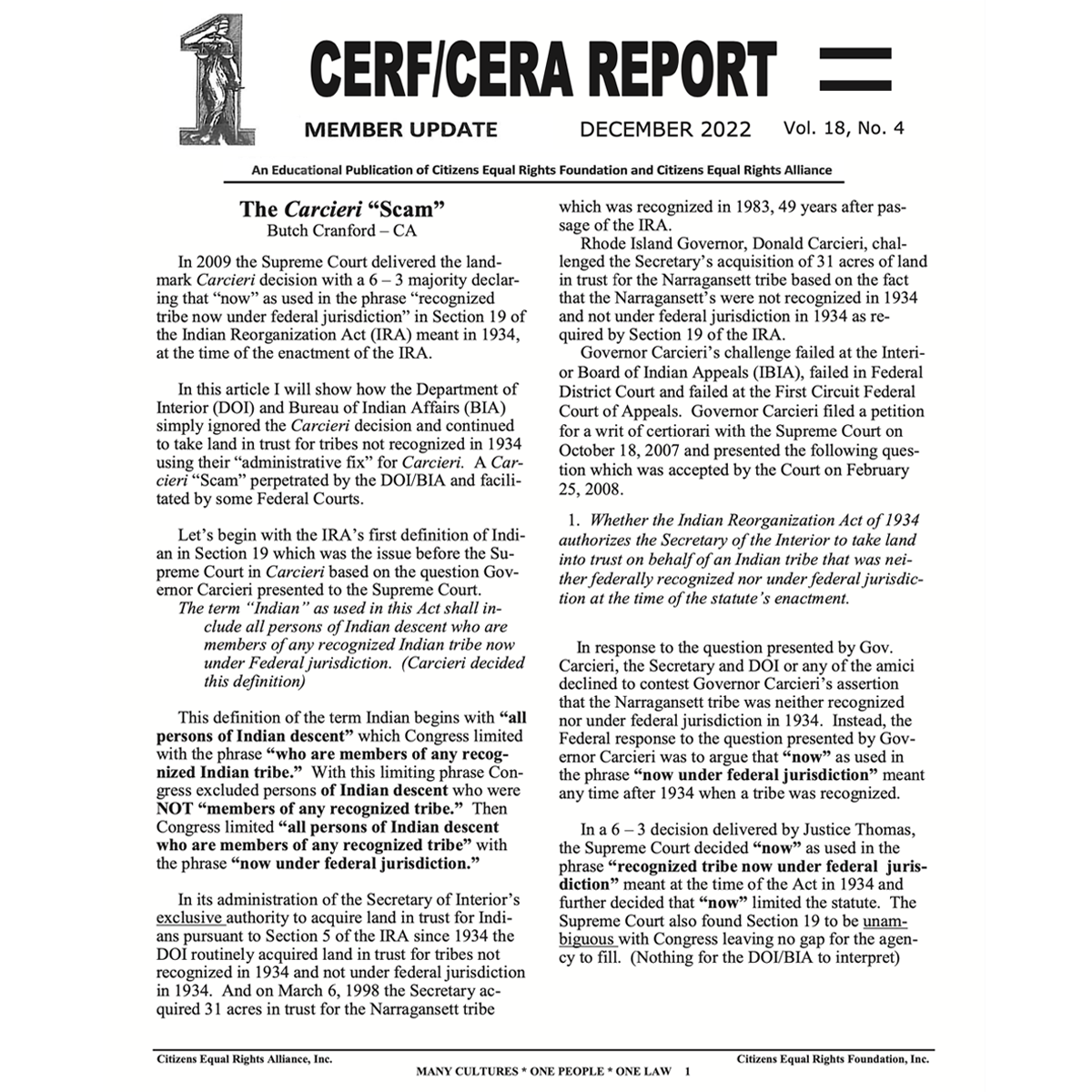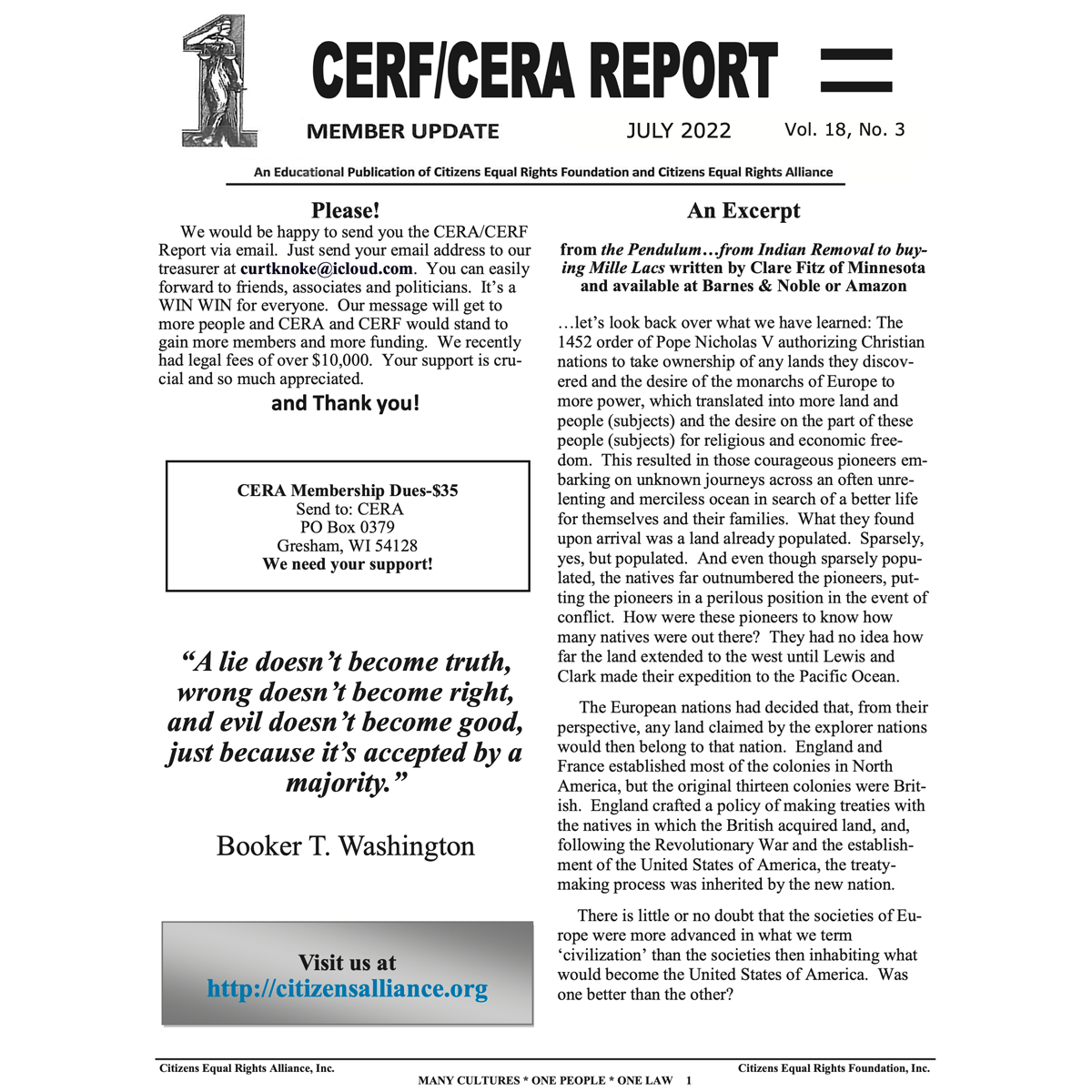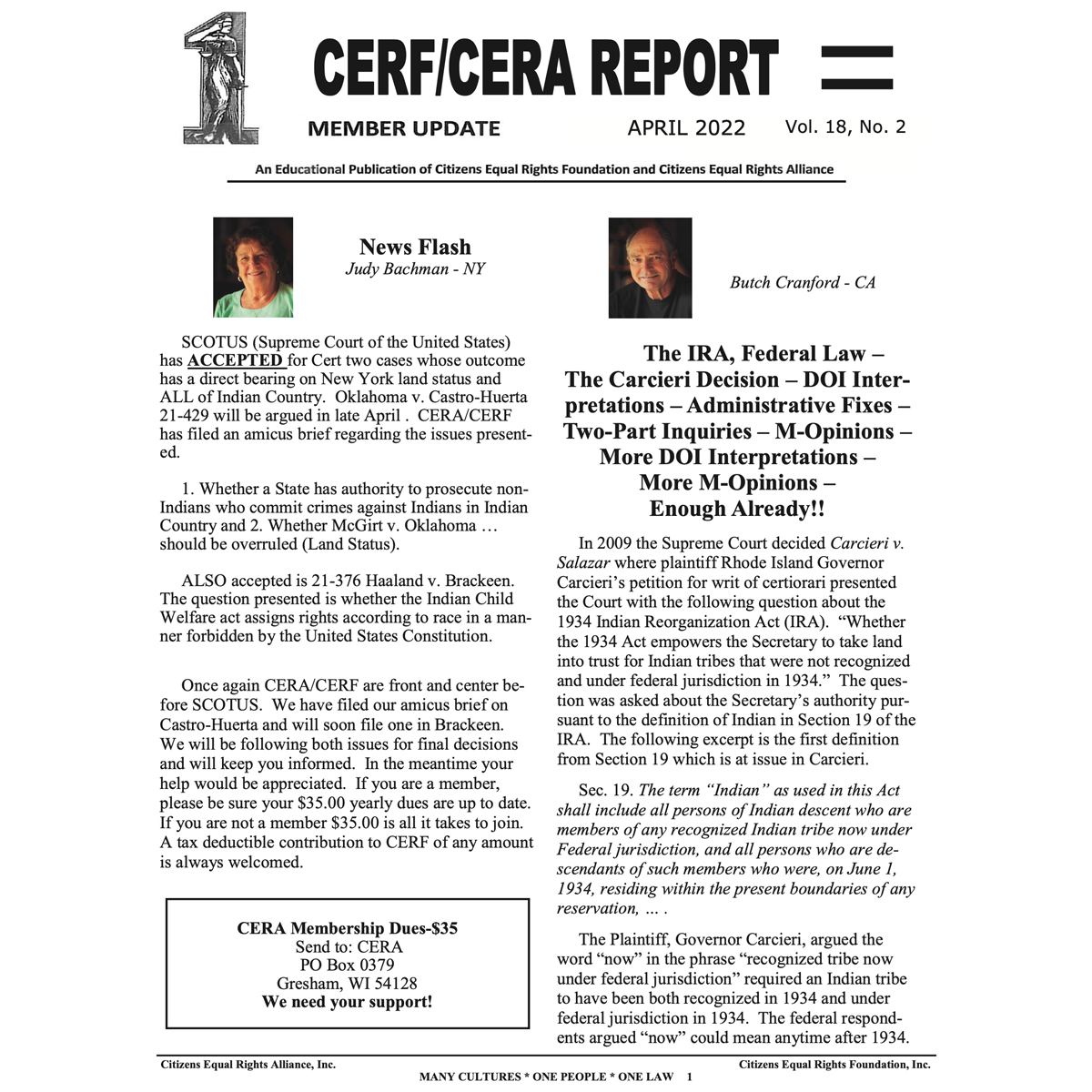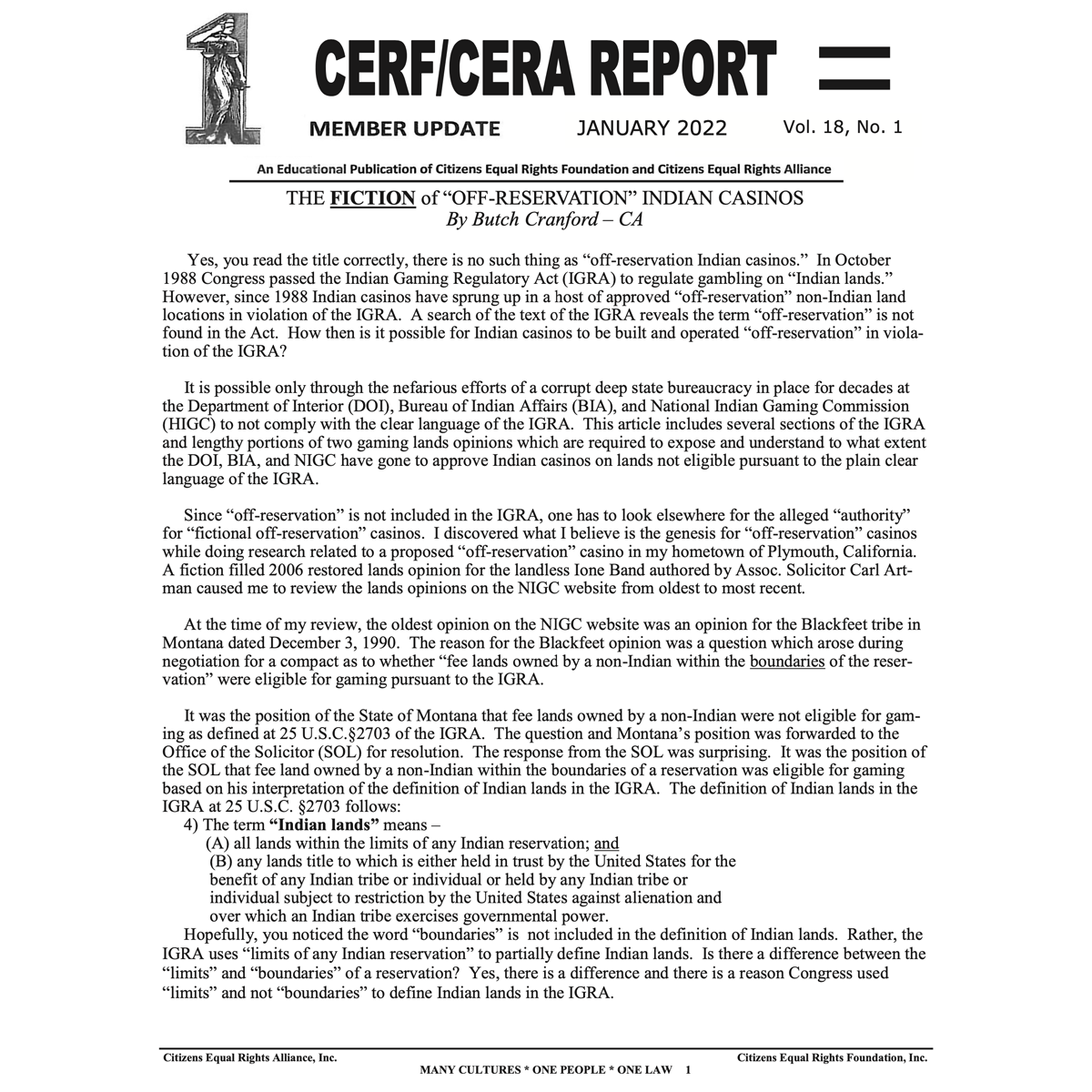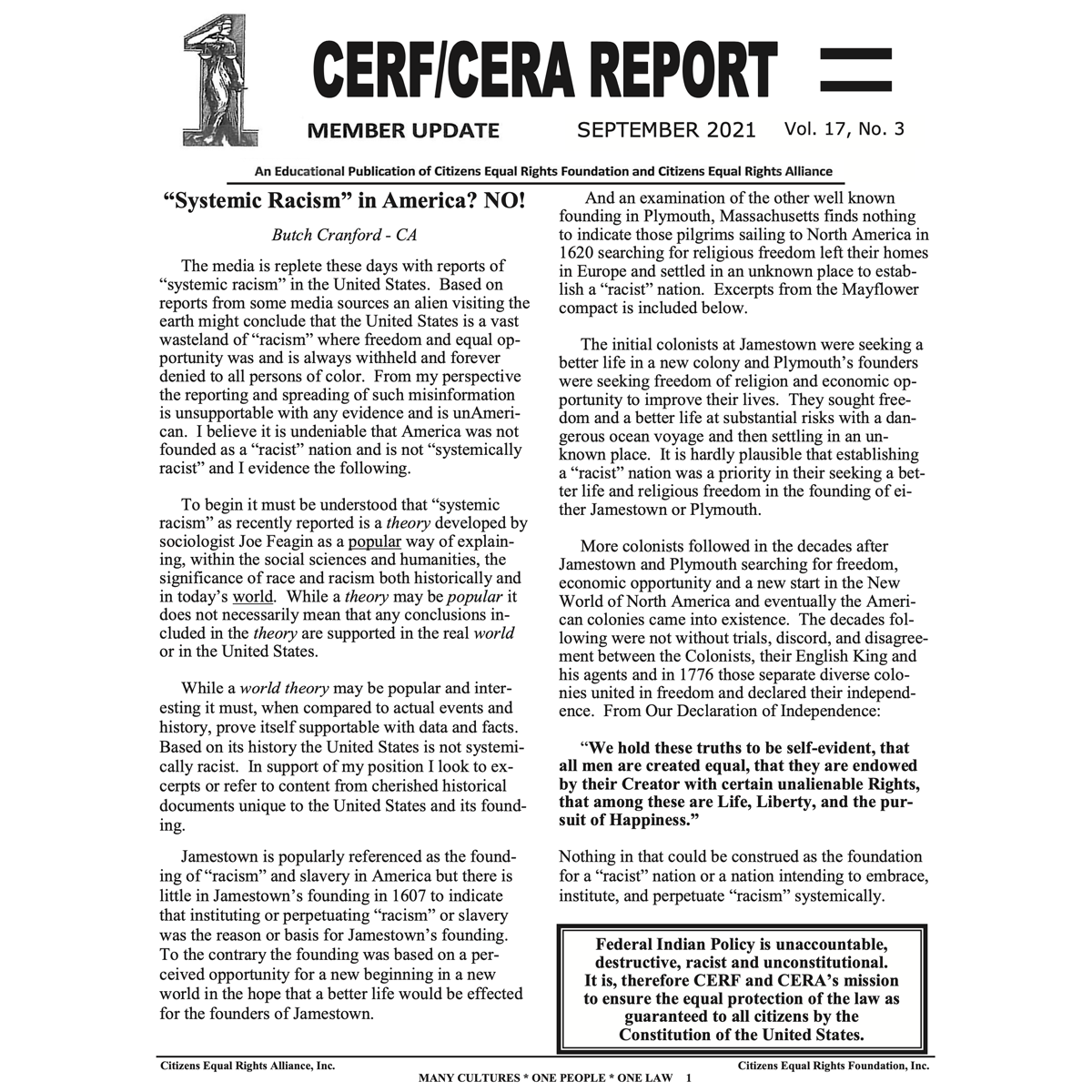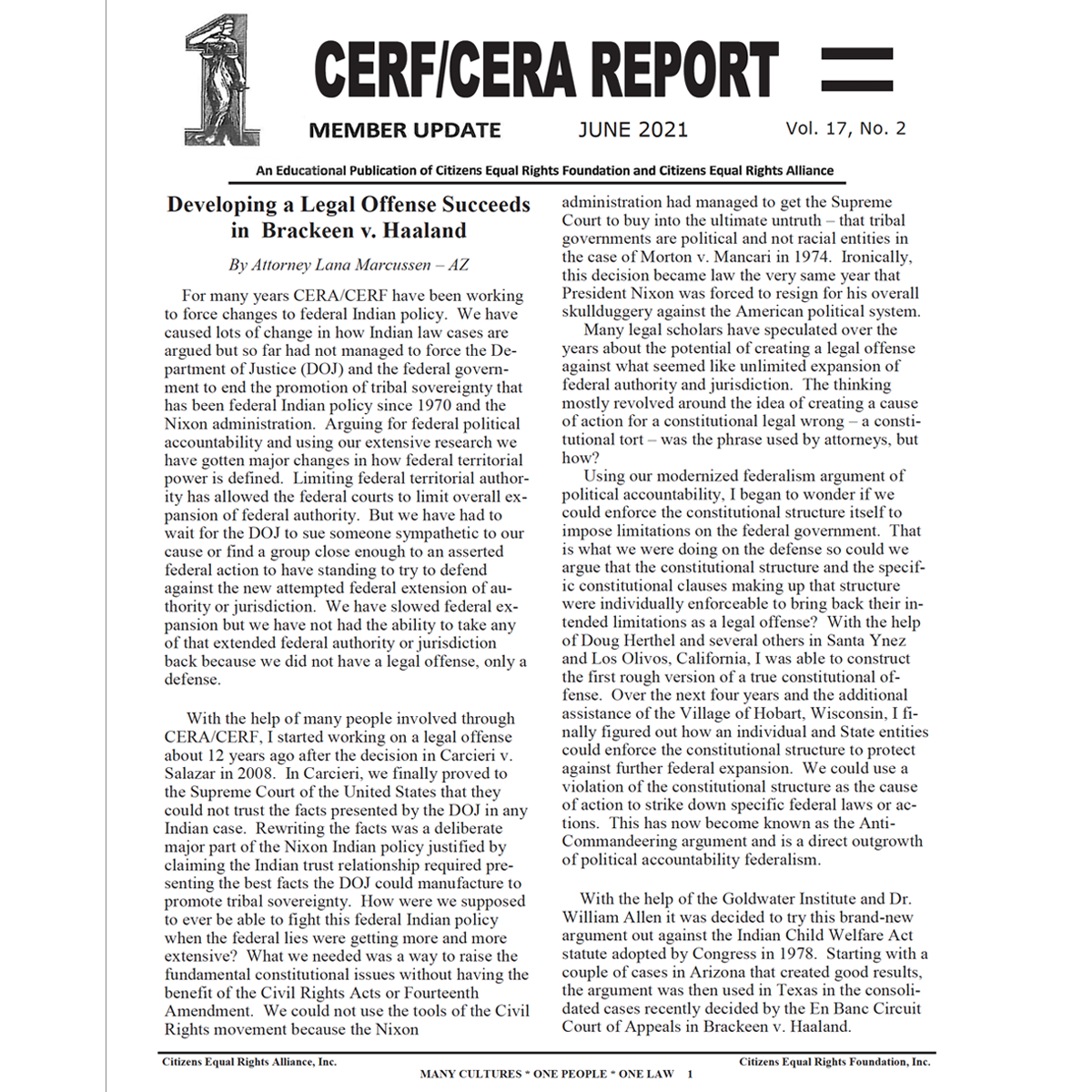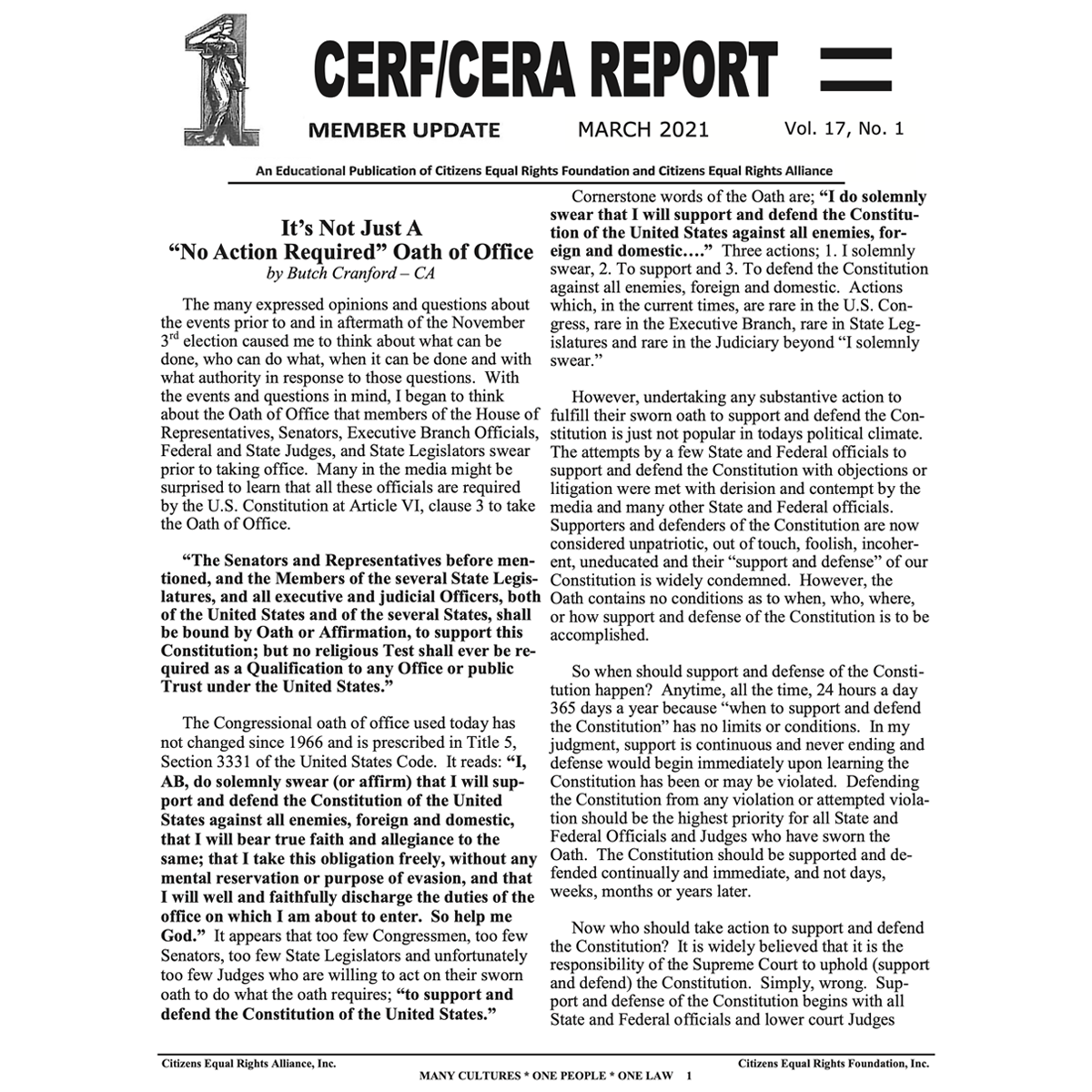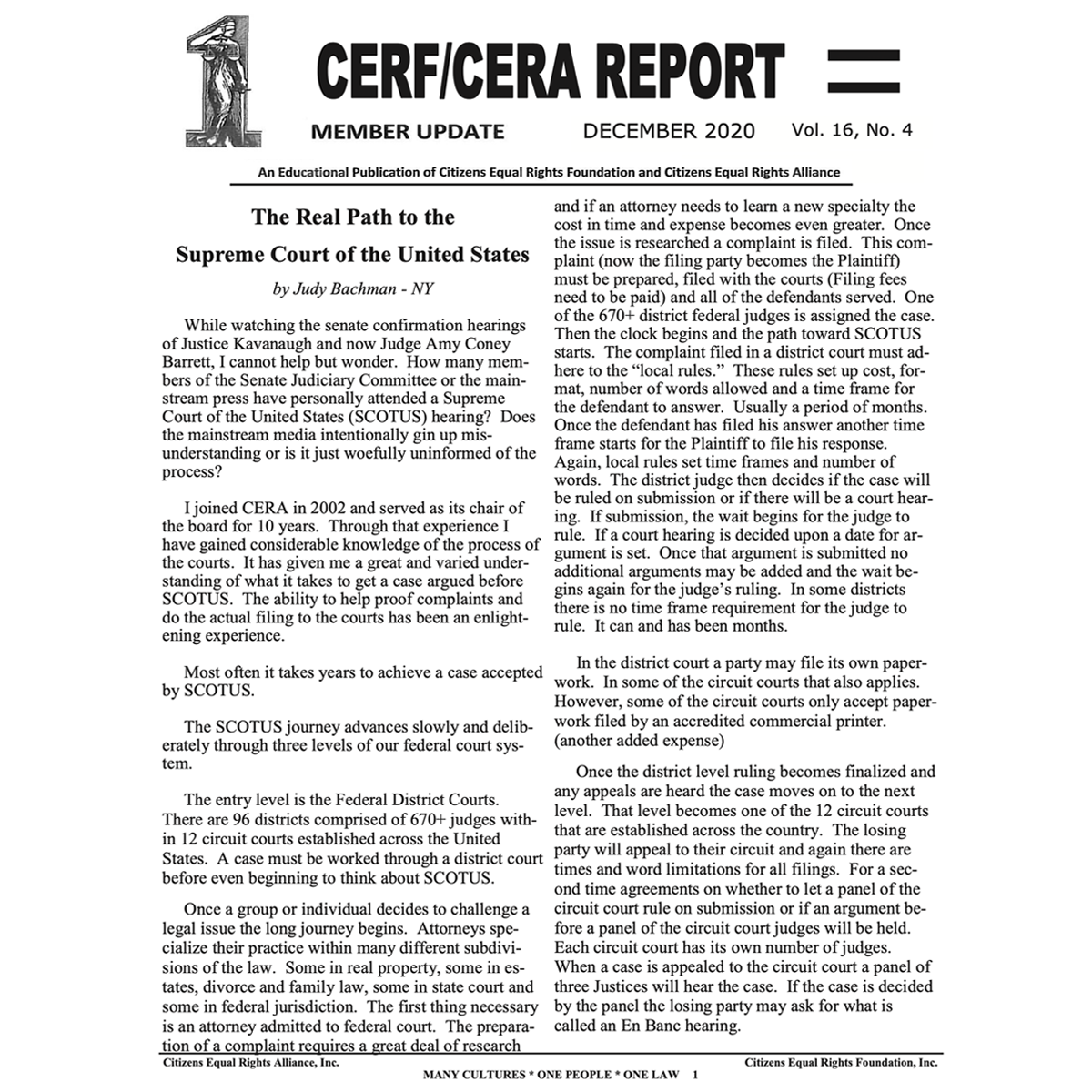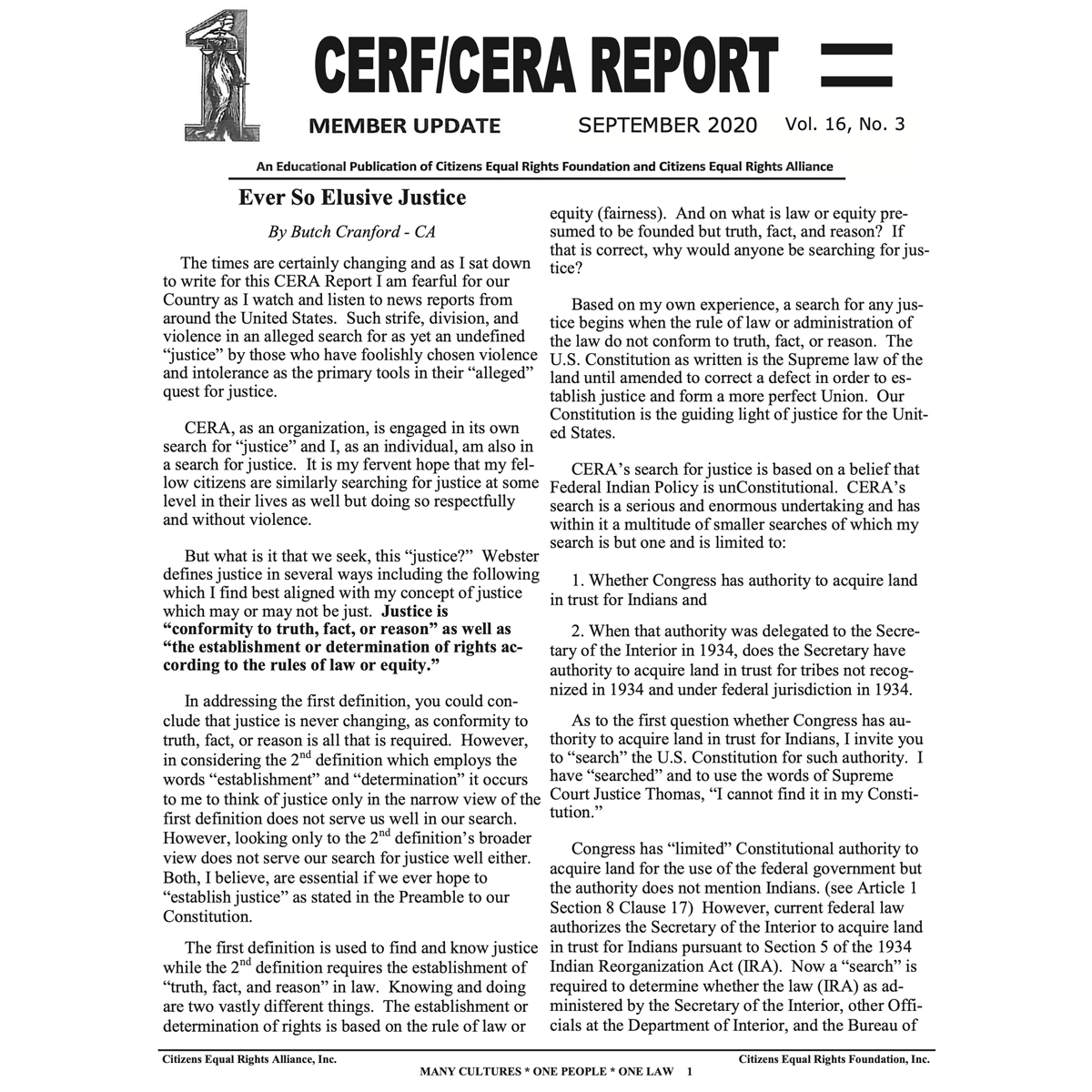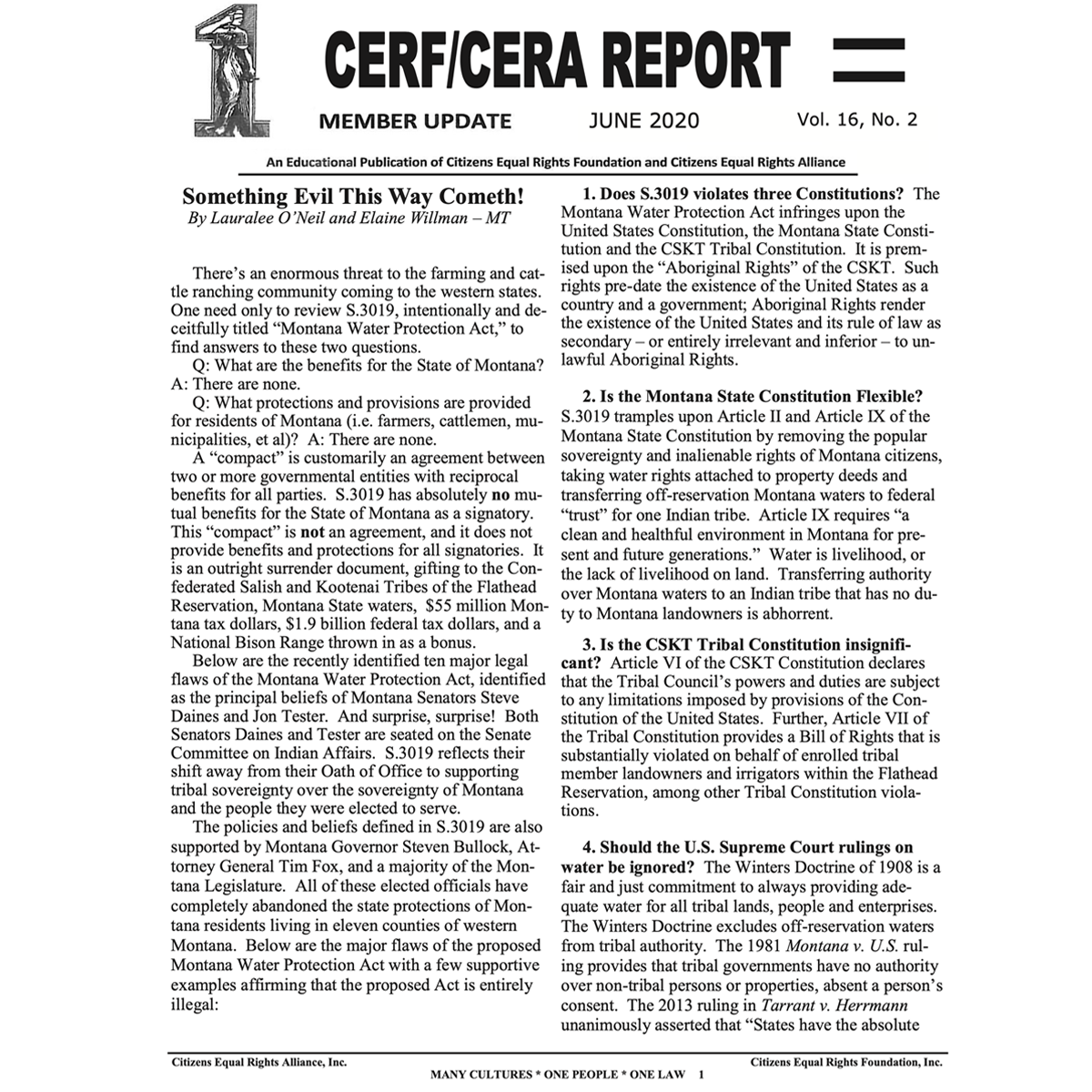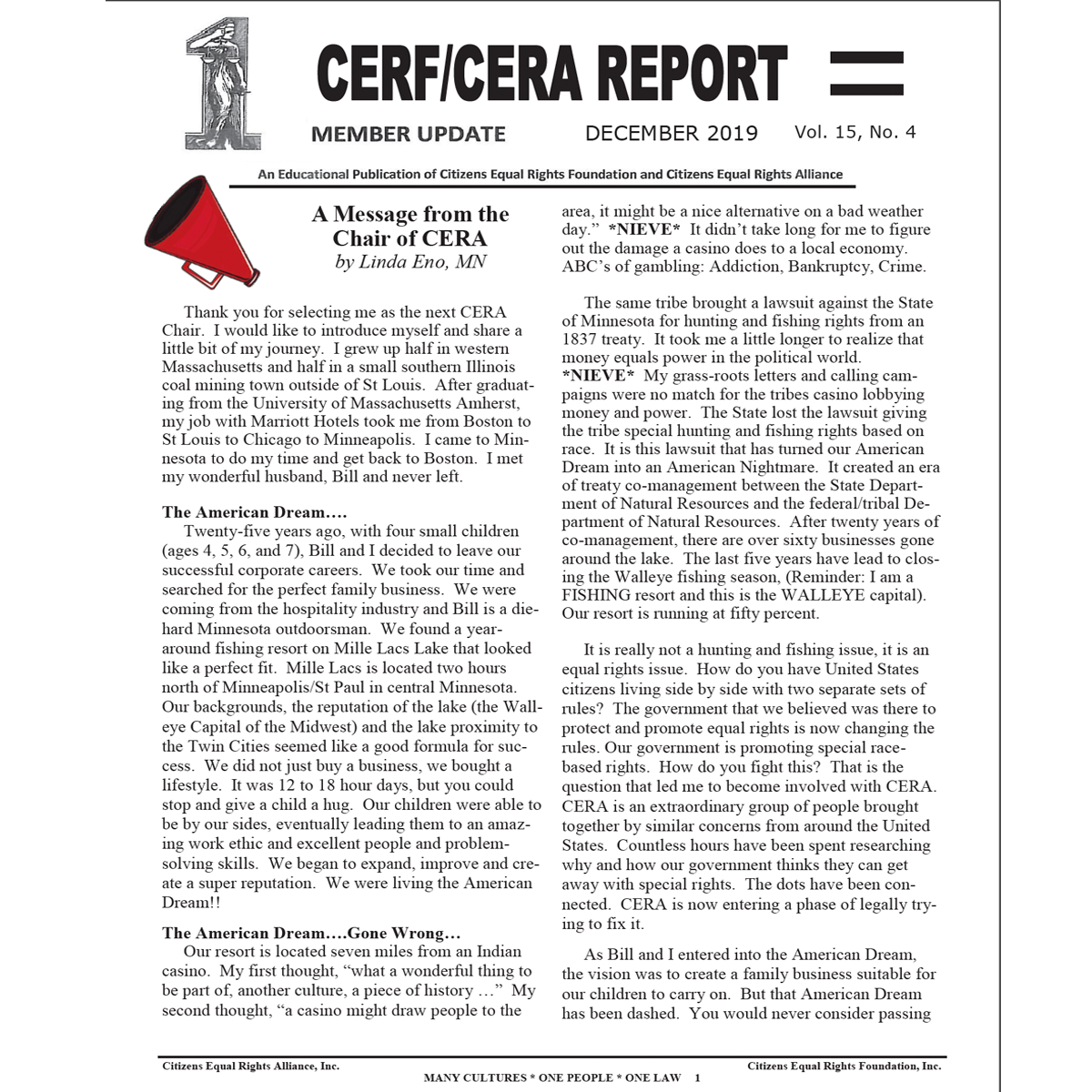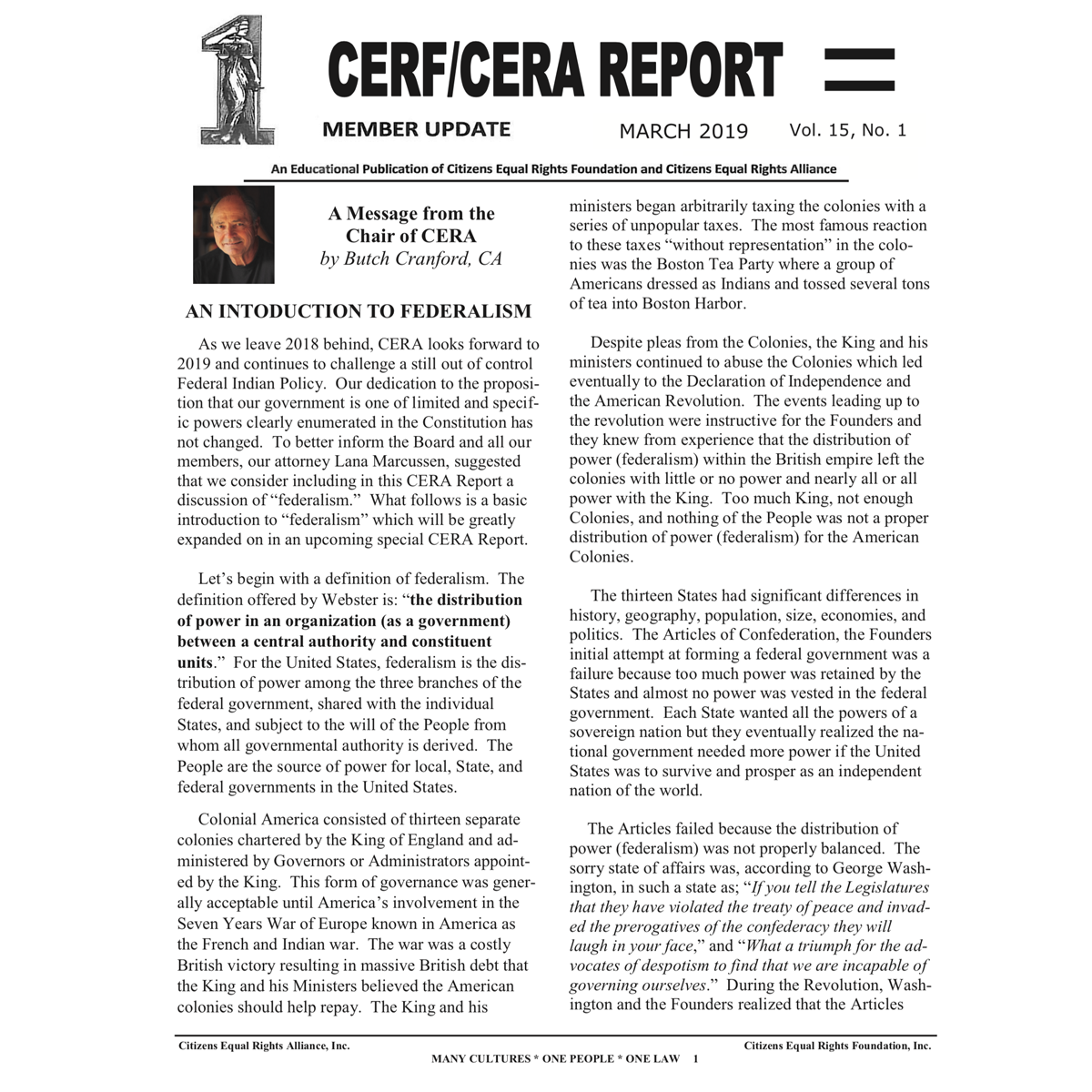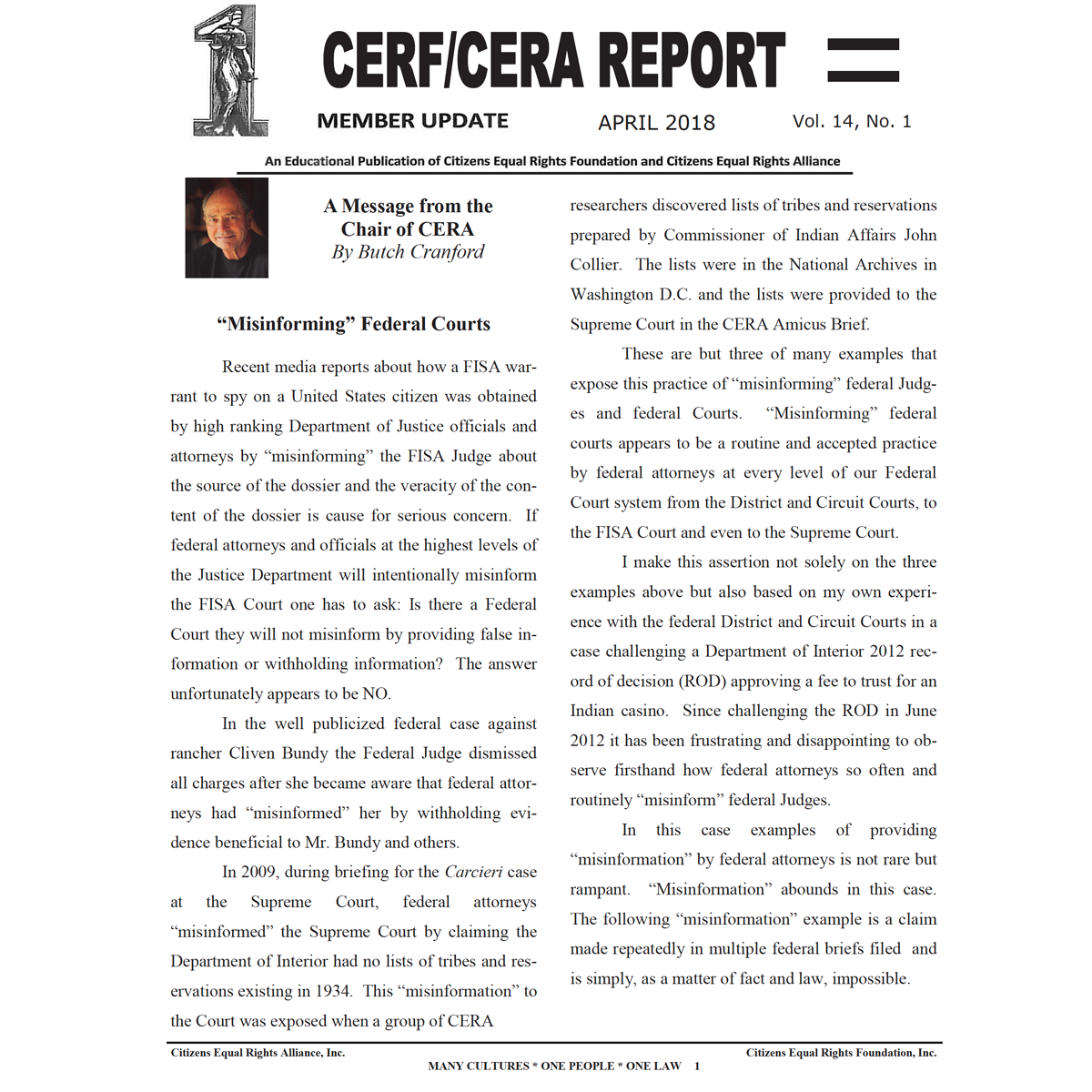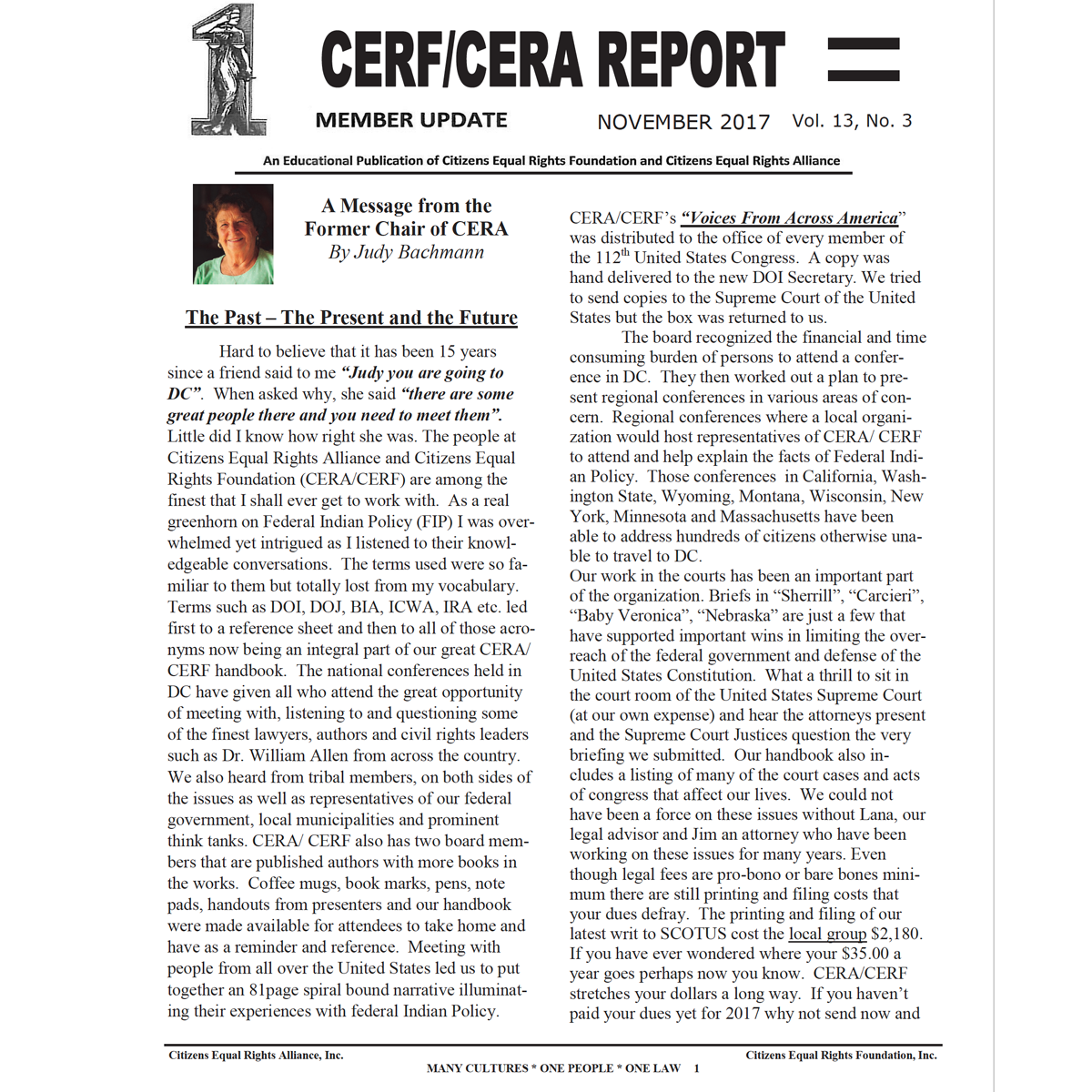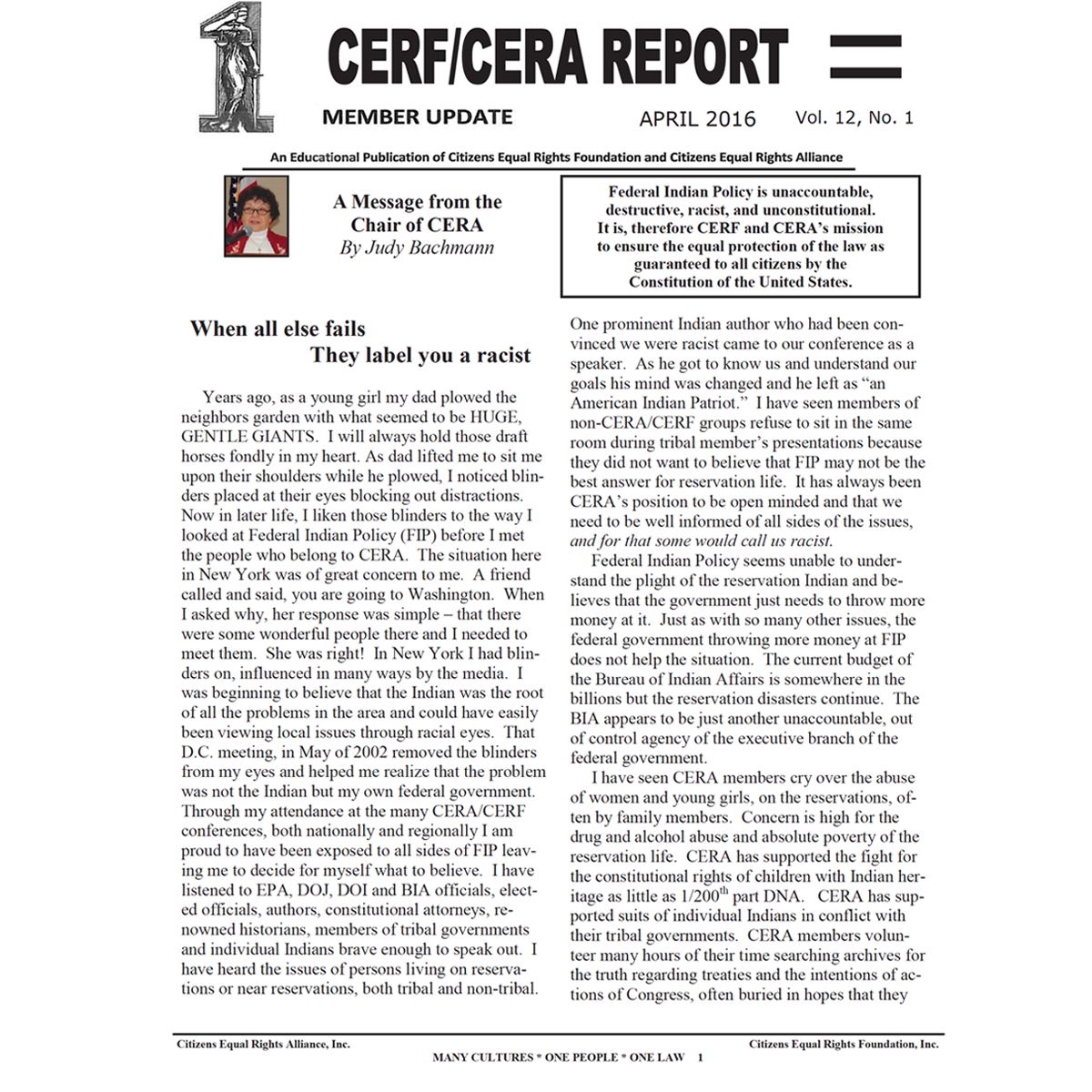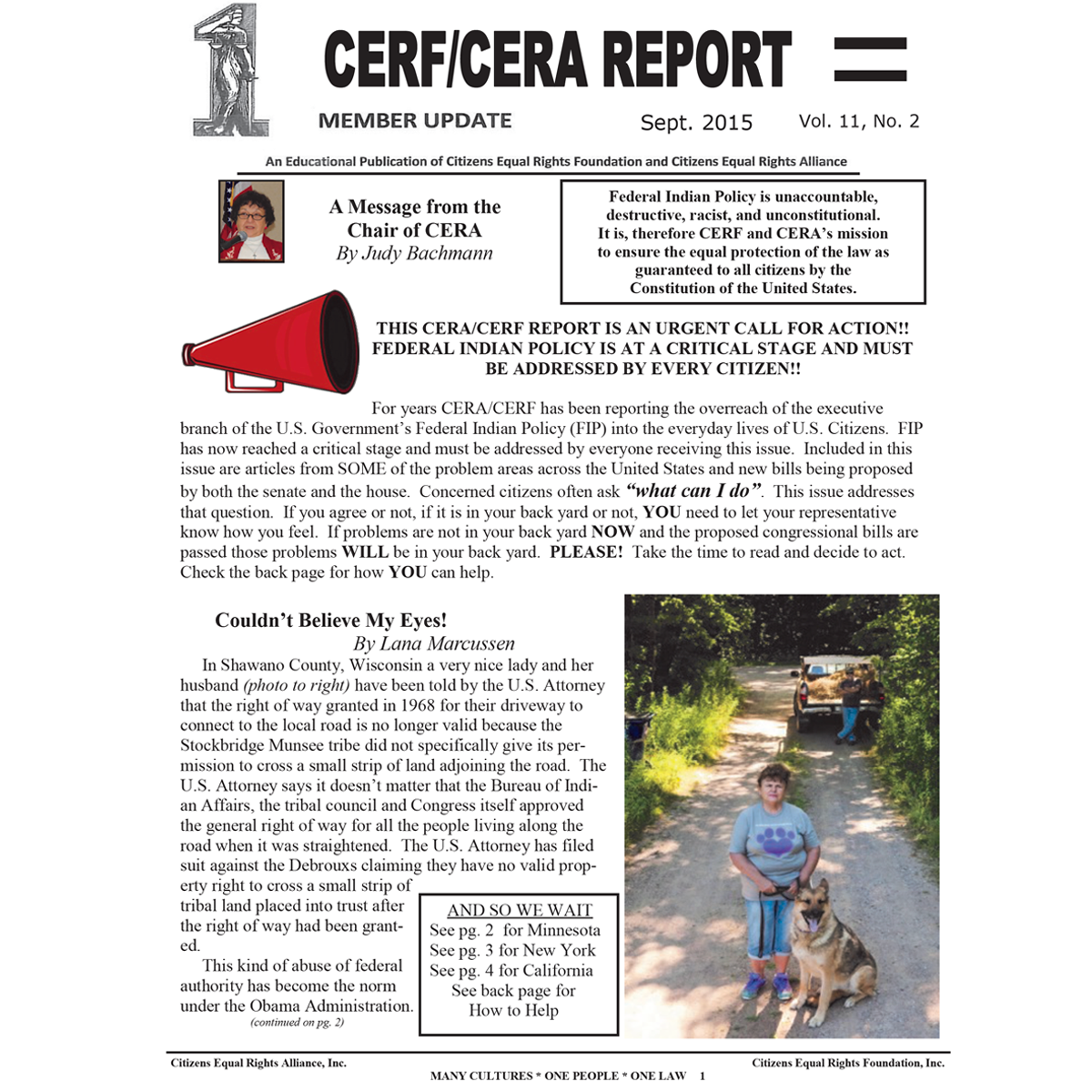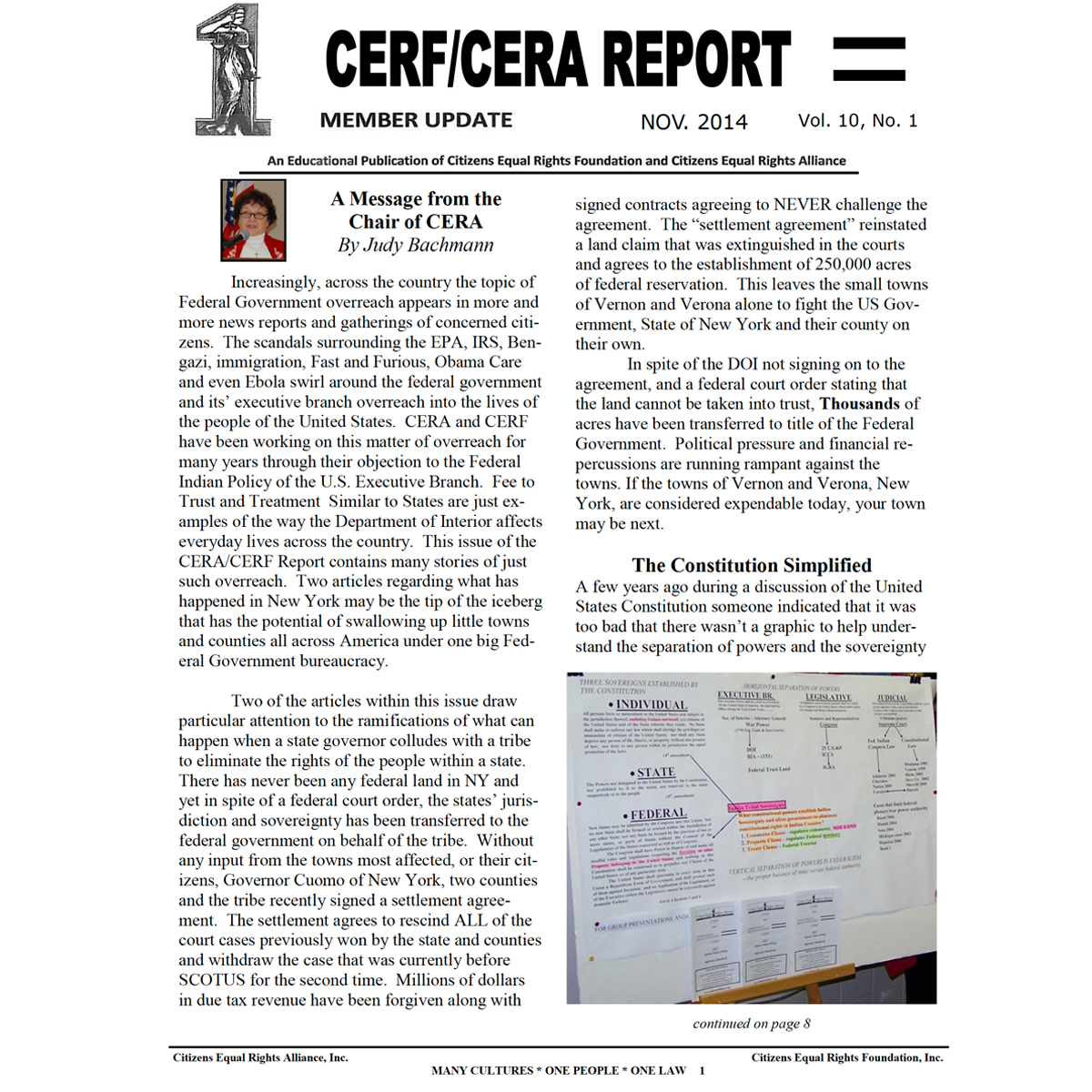“The spirit of resistance to government is so valuable on certain occasions, that I wish it to be always kept alive.”
–Thomas Jefferson, to Abigail Smith Adams, February 22, 1787
Who We Are
Citizens Equal Rights Alliance (CERA)
Citizens Equal Rights Foundation (CERF)
CERF/CERA believes and defends the constitutional rights of Indians and non-Indians. Our mission is to change federal Indian policies that threaten or restrict the individual rights of all citizens living on or near Indian reservations. We do not tolerate racial prejudice of any kind. We do not knowingly associate with anyone who discriminates based on race.
Indian Reservation Awareness
Federal Indian policies are decisions made expressly by the Executive Branch, Congress, State Legislators or Courts. Tribal Governments participate in, but do not make these decisions. CERA offers a broad range of information on this website but takes no specific position unless released in a formal CERA Press Release.
CERA/CERF Mission
Federal Indian Policy is unaccountable, destructive, racist, and unconstitutional. It is, therefore CERF and CERA’s mission to ensure the equal protection of the law as guaranteed to all citizens by the Constitution of the United States.
Send us a message
Tell us about any local issues or questions you might have.
MESSAGE US
Legal Terms
citizen, n. 1. A person who, by either birth or naturalization, is a member of a political community, owing allegiance to the community and being entitled to enjoy all its civil rights and protections; a member of the civil state, entitled to all its privileges.
discrimination, n, 1. The effect of a law or established practice that confers privileges on a certain class or that denies privileges to a certain class because of race, age, sex, nationality, religion or handicap. – Federal law, including Title VII of the Civil Rights Act, prohibits employment discrimination based on any one of those characteristics. Other federal statutes, supplemented by court decisions, prohibit discrimination in voting rights, housing, credit extension, public education and access to public facilities. State laws provide further protections against discrimination. 2. Differential treatment; esp., a failure to treat all persons equally when no reasonable distinction can be found between those favored and those not favored.
Indian country. 1. The land within the borders of all Indian reservations, the land occupied by an Indian community (whether or not located within a recognized reservation), and any land held in trust by the United States but beneficially owned by an Indian tribe. 2. Hist. Any region (esp. during the U.S. westward migration) where a person was likely to encounter Indians.
Indian land. Land owned by the United States but held in trust for and used by American Indians. – Also termed Indian tribal property.
Indian reservation. An area that the federal government has designated for use by an American Indian tribe, where the tribe generally settles and establishes tribal government.
Indian title. A right of occupancy that the federal government grants to an American Indian tribe based on the tribe’s immemorial possession of the area. – Also termed aboriginal title.
Indian tribe. A group, band, nation, or other organized group of indigenous American people, including any Alaskan native village, that is recognized as eligible for special programs and services provided by the U.S. government because of Indian status (42 USCA 9601 (36)); esp., any group having a federally recognized governing body that carries out substantial government duties and powers over an area (42 USCA 300f(14); 40 CFR 146.3). – A tribe may be identified in various ways, esp. by past dealings with other tribes or with the federal, state or local government, or by recognition in historical records.
plenary. adj. 1. Full; complete; entire [plenary authority]. 2. (Of an assembly) to be attended by all members or participants [plenary session]
sedition, n. An agreement, communication, or other preliminary activity aimed at inciting treason or some lesser commotion against public authority; advocacy aimed at inciting or producing–and likely to incite or produce–imminent lawless action. – At common law, sedition included defaming a member of the royal family or the government. The difference between sedition and treason is that the former is committed by preliminary steps, while the latter entails some overt act for carrying out the plan. But of course, if the plan is merely for some small commotion, even accomplishing the plan does not amount to treason.
sovereign, n. 1. A person, body, or state vested with independent and supreme authority; 2. The ruler of an independent state. – Also spelled sovran. See Sovereignty.
immunity. 1. Any exemption from a duty, liability, or service of process; esp., such an exemption granted to a public official.
sovereign immunity. 1. A government’s immunity from being sued in it’s own courts without its consent. – Congress has waived most of the federal government’s sovereign immunity. See FEDERAL TORT CLAIMS ACT. 2. A states immunity from being sued in federal court by the state’s own citizens.– Also termed governmental immunity.
sovereign immunity. 1. A government’s immunity from being sued in it’s own courts without its consent. – Congress has waived most of the federal government’s sovereign immunity. See FEDERAL TORT CLAIMS ACT. 2. A states immunity from being sued in federal court by the state’s own citizens.– Also termed governmental immunity.
sovereign people. The political body consisting of the collective number of citizens and qualified electors who possess the powers of sovereignty and exercise them through their chosen representatives.
sovereign power. The power to make and enforce laws.
sovereign right. A unique right possessed by a state or its agencies that enables it to carry out its official functions for the public benefit, as distinguished from certain proprietary rights that it may possess like any other private person.
sovereign state. A state that possesses an independent existence, being complete in itself, without being merely part of a larger whole to whose government it is subject; a political community whose members are bound together by the tie of common subjection to some central authority, whose commands those members must obey. Also termed independent state.
sovereignty. 1. Supreme dominion, authority, or rule. 2. The supreme political authority of an independent state. 3. The state itself.
external sovereignty. The power of dealing on a nation’s behalf with other national governments.
internal sovereignty. The power that rulers exercise over their own subjects.
supremacy. The position of having the superior or greatest power or authority.
supreme. adj. (Of a court, power, right, etc.) highest; superior to all others.
treaty. 1. A formally signed and ratified agreement between two nations or sovereigns; an international agreement concluded between two or more states in written form and governed by international law. – A treaty is not only law in each state but also a contract between the signatories. Also termed accord; convention; covenant; declaration; pact.
trust. 1. The right, enforceable solely in equity, to the beneficial enjoyment of property to which another person holds legal title; a property interest held by one person (the trustee) at the request of another (the settler) for the benefit of a third party (the beneficiary). – For the trust to be valid, it must involve specific property, reflect the settler’s intent, and be created for a lawful purpose. 2. A fiduciary relationship regarding property and subjecting the person with title to the property to equitable duties to deal with it for another’s benefit; the confidence placed in a trustee, together with the trustee’s obligations toward the property and the beneficiary. – A trust arises as a result of a manifestation of an intention to create it. See FIDUCIARY RELATIONSHIP. 3. The property so held; TRUST FUND. 4. A business combination that aims at monopoly. See ANTI-TRUST.
voluntarily, adv. Intentionally; without coercion.
voluntary, adj. 1. Done by design or intention [voluntary act]. 2. Unconstrained by interference; not impelled by outside influence [voluntary statement]. 3. Without valuable consideration; gratuitous [voluntary gift]. 4. Having merely nominal consideration [voluntary deed].
“You cannot become thorough Americans if you think of yourselves in groups. America does not consist of groups. A man who thinks of himself as belonging to a particular national group in America has not yet become an American.”
–Woodrow Wilson, May 10, 1915
Featured Article
COURT CASES / BRIEFS
CERF exposes in U.S. Supreme Court Amicus Brief a 170-year federal government conspiracy to employ hidden Civil War-era war powers used during Reconstruction to deprive citizens of their constitutional rights.
Citizen Equal Rights Foundation (CERF) Amicus Curiae Brief filed in United States v. Cooley, Docket No. 19-1414, on February 19, 2021.
View larger or save document to your computer. DOWNLOAD
JOIN CERA | Membership Perks
As a CERA member you will receive our highly regarded publication, the CERA Journal and a member’s newsletter. CERA gratefully accepts amounts above the annual dues as donations. A one year CERA Journal and membership is only $35.00 or donate to CERF in any amount.
Your contribution is needed to:
CERF
A donation to CERF, which is non-profit foundation (501(c)(3)), is tax deductible. CERF is focused on education and legal actions that will promote fairness and equality in federal Indian policy.
CERA
CERA is a 501(c)(4) non-profit and is focused on public education through our newsletter and makes a concerted effort to educate public officials and influence legislation on these issues at all levels of government. Our dues are annual.
DONATIONS & DUES
CERA gratefully accepts amounts above the annual dues as donations. Dues and contributions to CERA are not tax deductible. A one year CERA Journal and membership is only $35.
By Mail: Memberships, Donations or Pledges
Please make membership checks payable to CERA. Membership payments are not tax deductible.
Make donations or pledges payable to CERF. Contributions to CERF are tax deductible.
Mail your contribution (or monthly pledge) along with your name, mailing address, phone number and email address to:
CERA / CERF
P.O. Box 0379
Gresham, WI 54128-0379
LOOKING TO BECOME A CERA MEMBER?
Any donation to CERA over the $35 annual membership dues benefits CERF which is a non-profit foundation (501(c)(3)), is tax deductible. CERF is focused on education and legal actions that will promote fairness and equality in federal Indian policy.

